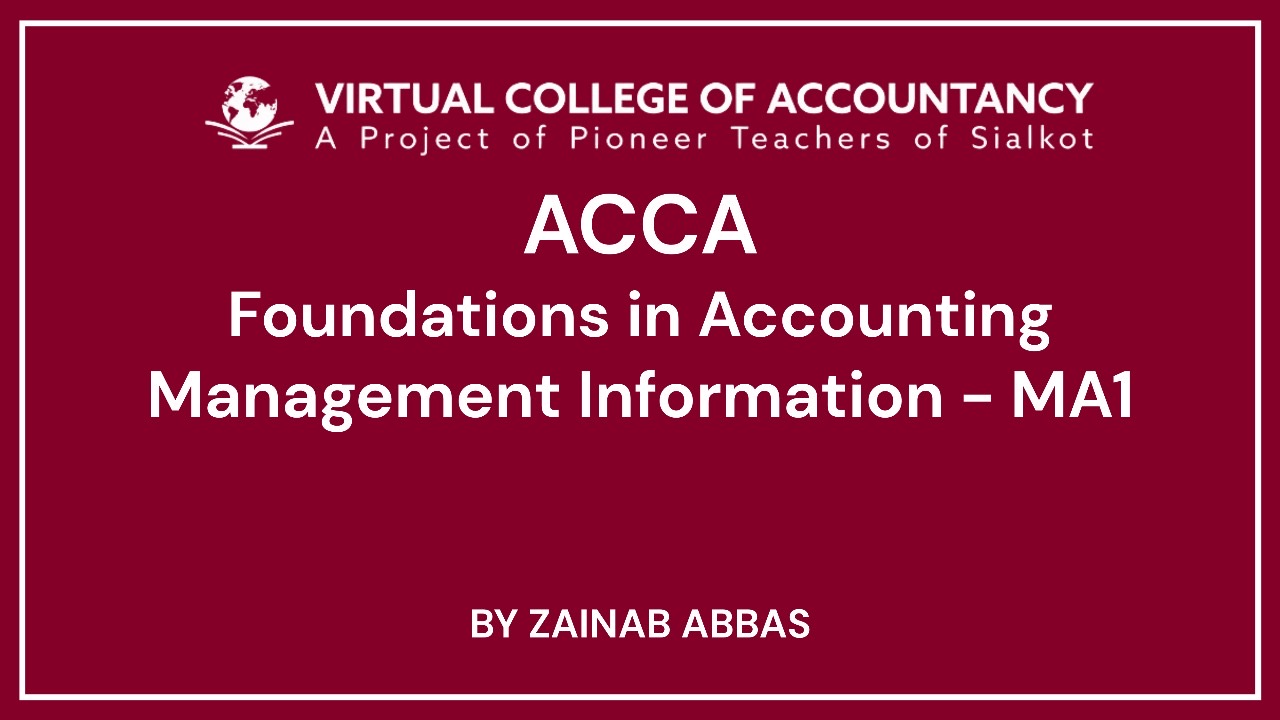About this course
Management Information (MA1) is one of the foundation-level subjects of the ACCA qualification, designed to introduce students to the essential principles of management accounting. This course provides a strong understanding of how financial and non-financial information is used within organizations to plan, monitor, and make effective business decisions. It serves as the stepping stone for higher-level management accounting papers and helps students build practical skills applicable in real-world business environments.
Throughout this course, students will learn how management information supports business performance and decision-making. They will understand how data is collected, processed, and analyzed to generate valuable insights for managers. The syllabus covers topics such as costing methods, budgeting, variance analysis, performance measurement, and decision-making techniques. Students will also explore the principles of cost classification, behavior, and absorption, enabling them to identify and manage costs efficiently in different business scenarios.
MA1 emphasizes both theoretical understanding and practical application. Students will learn to prepare simple budgets, forecast financial outcomes, and analyze variances to evaluate performance. The course also highlights the importance of internal control systems, accuracy in data recording, and ethical behavior in managing financial information. By the end of the course, learners will be able to interpret and communicate management information clearly, ensuring that managers can make informed and effective decisions.
In addition, this subject enhances students’ analytical and problem-solving abilities. They will develop an understanding of how technology supports the management information process and gain insight into the modern tools businesses use for performance evaluation.
Overall, Management Information (MA1) equips students with a practical foundation in management accounting, enabling them to understand the flow of information within an organization, support management planning and control, and contribute to efficient business operations. It is an essential subject for anyone aspiring to pursue a successful career in accounting, finance, or business management.
Comments (0)
Introduction to Management Information- MA1
1 Parts
Orientation Lecture
-
Chapter 1: Business Organisations and Transactions
4 Parts
Lecture 1: Business Organisations
-
Lecture 2: Centralisation and Decentralisation
-
Lecture 3: Policies, Procedures & Best Practices
-
Lecture 4: Business Transactions
-
Chapter 3: Information for Management
1 Parts
Data and Information
-
Chapter 4: Cost Classification and Behaviour
6 Parts
Lecture 1: Cost Units
-
Lecture 2: Cost Categories
-
Lecture 3: Direct Costs & Indirect Costs
-
Lecture 4: Variable Costs & Fixed Costs
-
Lecture 5: Mixed Costs & Stepped Fixed Costs
-
Chapter 4: Practice Session
-
Chapter 5: Calculating and Reporting Profit
3 Parts
Lecture 1: Cost Cards
-
Lecture 2: Profit Statements
-
Lecture 3: Profit Reconciliation
-
Chapter 6: Cost Centres, Profit Centres, and Investment Centres
2 Parts
Lecture 1: Responsibility Accounting and Cost Centres
-
Lecture 2: Profit Centres and Investment Centres
-
Chapter 7: Measuring Performance
5 Parts
Lecture 1: Performance Measurements
-
Lecture 2: Cost Centres PM
-
Lecture 3: Profit Centre PM
-
Lecture 4: Investment Centre PM
-
Chapter 7: Practice Session
-
Chapter 8: Coding Systems
1 Parts
Coding Systems
-
Chapter 9: Procedures for Purchasing
2 Parts
Lecture 1: Documents
-
Lecture 2: Free Inventory and Material Control Cycle
-
Chapter 10: Procedures for Recording Labour Costs and Sales Income
2 Parts
Lecture 1 :Recording Labour Costs
-
Lecture 2: Processing Sales
-
Chapter 11: Accounting for Materials
8 Parts
Lecture 1: Raw Material Order Quantity
-
Lecture 2 - Accounting For Direct And Indirect Materials
200 MB
Lecture 3 - FIFO
200 MB
Lecture 4 - LIFO
200 MB
Lecture 5 - CWA
200 MB
Lecture 6 - PWA
200 MB
Lecture 7 - Valuation Methods Comparisons
200 MB
Practice Session
200 MB
Chapter 12: Accounting for Labour
3 Parts
Lecture 1: Classifying Direct and Indirect Labour Costs
-
Lecture 2: Calculating Direct and Indirect Labour Costs
-
Lecture 3: Accounting for Labour Costs
-
Chapter 13: Employee Remuneration, Productivity and Labour Costs
6 Parts
Lecture 1: Time Based and Piecework Method
-
Lecture 2: Other Forms of Remuneration
-
Lecture 3: Changing Remuneration
-
Lecture 4: Changing Levels of Production
-
Lecture 5: Analysing Earnings and Total Labour Cost
-
Practice Session
-
Chapter 16 Spreadsheet
1 Parts
Lecture 1 Introduction to Spreadsheets
200 MB
CHAPTER 17: SPREADSHEET SKILLS 1
5 Parts
CH# 17 Lec 1 Entering, Moving and Copying Data
-
CH# 17 Lec 2 Basic Mathematical Operations
-
CH# 17 Lec 3 Relative and Absolute Cell References
-
CH# 17 Lec 4 Average and Round Off Functions
-
CH# 17 Lec 5 If Function
-
CH#18 SPREADSHEET 2
2 Parts
CH#18 Lect 1 Sort and Filter Function
-
CH#18 Lec 2 Find, Replace and Formatting
-

0
0 Reviews






